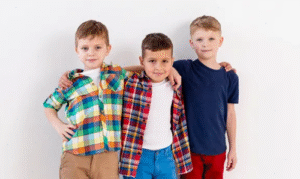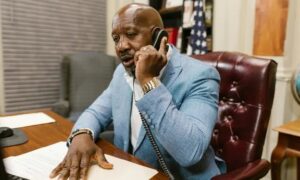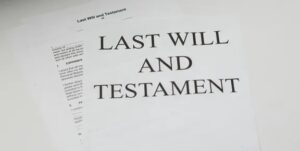I Left My $4.3 Million Fortune to Three Boys I’d Never Met — and Nothing to My Own Children

At the age of eighty-seven, I made the most important—and most controversial—decision of my life. I rewrote my will and left every cent of my $4.3 million estate to three young boys I had never met: triplets named Kyran, Kevin, and Kyle.
To my own children, Caroline and Ralph, I left nothing.
It shocked everyone—friends, neighbors, even my lawyer. People whispered that I had lost my mind, that age and grief had clouded my judgment. But I have never thought more clearly in my life. Because those three boys are not strangers. They are the legacy of a promise I made over seventy years ago—a debt of love and sacrifice I could never repay until now.
A Life of Work, Love, and Disappointment
My name is Carlyle Whitman, and for most of my life, I believed I had everything. I built a small manufacturing company from the ground up—working eighteen-hour days, missing holidays, and risking every dollar I had to keep the dream alive. Over six decades, that dream grew into a multi-million-dollar enterprise.
I didn’t do it alone. My wife, Marcy, was the anchor of my life—the quiet strength behind every success. She believed in me long before I believed in myself. Through every failure, every sleepless night, every near-bankruptcy, she was there, pouring tea at midnight, reminding me that we’d survive.
Together, we raised two children—our pride and joy, or so we thought. Caroline, our eldest, was clever and ambitious, always chasing status and luxury. Ralph, our son, followed the same path, building his wealth through risky investments and fast deals. Both had inherited my drive but not my heart.
We gave them everything: the best schools, the best homes, the best start in life. But perhaps, in giving too much, we took away the lessons that truly matter.
The Day Everything Changed
Six months ago, I collapsed in my study. I remember the sharp pain in my chest, the sound of my books scattering to the floor, and then—darkness. Our housekeeper found me unconscious and called an ambulance. The doctors said it was a mild stroke, a warning sign that I needed rest.
I spent two weeks in the hospital. The days were long and silent, filled only by the steady beep of machines. I waited for my children to come.
Caroline called once. Her voice was distracted, rehearsed. “I’m so busy with work, Dad, but I’ll try to visit next week.” She never did.
Ralph didn’t call at all. He sent flowers with a card that read Get well soon—Ralph. No note. No phone call.
It was the nurses who sat with me and talked when I couldn’t sleep. Strangers cared more than my own blood.

Losing Marcy
Just as I began to recover, life dealt another blow. Marcy began feeling unwell—fatigued, pale, and fragile. We assumed it was her age catching up. But one morning, while tending her roses, she fainted in the garden.
The diagnosis came swiftly: late-stage cancer. The doctor’s tone was heavy with sympathy. “Three months, maybe four.”
I called Caroline first, my voice trembling. “Your mother’s sick, sweetheart. Please come home.”
She sighed. “Oh, Dad, I’ve got this conference next week. I’ll try to make it soon.” She never came.
I called Ralph next. He answered after five rings, distracted. “That’s awful news, Dad. I’ll give you a ring later.” He didn’t.
Marcy passed away quietly one crisp October morning. The sunrise poured through the curtains, painting her face gold as she took her last breath in my arms. My heart broke in that moment, but it shattered completely two days later when my lawyer phoned.
“Mr. Whitman,” he said hesitantly, “your children have been calling my office several times a day… asking about your condition. They want to know if you’re still alive.”
Still alive. Not How are you holding up? Not Is there anything you need?—just whether I was still breathing.
That was the moment I saw the truth for what it was. My children loved my money, not me.

The Decision
I called my lawyer the next morning. “I want to rewrite my will,” I said. “Caroline and Ralph will inherit nothing.”
He hesitated. “Then who, sir?”
“Three boys,” I said. “Triplets. In foster care.”
He looked at me like I’d lost my mind. “Do you know them?”
“Not yet,” I said. “But I will.”
He agreed to help, though I could see the confusion in his eyes. What could possibly connect an elderly man to three boys he’d never met?

The Secret from My Past
What my lawyer didn’t know was that, many years ago, during the war, I served alongside a man named Samuel Barrett. He was younger than me by a few years—sharp, funny, brave. We became brothers on the battlefield.
During a mission gone wrong, a grenade landed between us. Without hesitation, Samuel threw himself on it to save the rest of us. I can still hear the explosion, feel the shockwave, see the dust rising in the air. Samuel died instantly.
Before his last breath, he made me promise to look after his family if he didn’t make it home. I tried. I visited his widow and their baby daughter after the war, sent money when I could. But life, business, and distance pulled me away. The years passed. His family line continued without me—and I carried the guilt of breaking that promise for nearly seventy years.
Then one day, by sheer coincidence, I read an article about three boys in foster care whose parents had died in a hurricane. Their names caught my eye—Barrett. A social worker mentioned they were the great-grandsons of a war hero. Samuel Barrett.
It felt like fate was giving me a second chance.
Meeting the Triplets
At 87, the process of adopting or fostering children was complicated. The social workers were skeptical. “Mr. Whitman,” one of them said gently, “you’re almost ninety years old. Why not just donate to charity?”
I smiled. “Because I don’t want to donate—I want to love. And I owe these boys more than money.”
After several interviews, home inspections, and legal battles, they approved me as a guardian. The day Kyran, Kevin, and Kyle walked into my home, laughter returned to the halls for the first time in years.
Kyran, the oldest by two minutes, wanted to be a pilot. Kevin, quiet and curious, could lose himself in books for hours. And little Kyle, clutching a blue blanket, followed me everywhere, asking endless questions about the “old days.”
They reminded me what family truly means.
Confrontation
When Caroline found out about the change in my will, she was livid. She called at dawn, shouting through the phone.
“You’re giving our inheritance to strangers? Dad, have you lost your mind?”
I let her speak, then said quietly, “Strangers? The strangers you talk about remind me more of family than my own children do. When your mother was dying, you couldn’t spare a day. These boys would have sat by her bedside without being asked.”
She hung up in anger.
Ralph came later that week, red-faced and furious. “You’re humiliating us!” he shouted. “You’d rather give millions to kids you don’t know than to your own blood?”
Then I told him the truth about Samuel Barrett—about the promise, the grenade, the guilt. Ralph’s expression changed. The anger drained from his face, replaced by shame.
“I didn’t know,” he whispered.
“I never told you,” I said. “But you needed to know the kind of man who saved your father’s life.”
Ralph left quietly that evening. A week later, he came back—with gifts for the boys. Slowly, he began to understand.
Finding Peace
These boys filled my home with life again. We read stories together, baked cookies, built model airplanes. They called me “Grandpa Carlyle” from the very first week.
Caroline eventually reached out again, this time calmer. “Do you really love them like you love us?” she asked over the phone.
I thought about it for a long moment. “Love isn’t measured by blood,” I said. “It’s measured by presence. They were here when you weren’t. They needed me, and I needed them.”
She cried softly on the other end but said nothing more.
My Legacy
Now, as I write this, I can feel my health fading. I move slower, breathe heavier. But I am not afraid. I know I’ve done what is right.
I have kept my promise to Samuel Barrett. I have turned grief into purpose. And I have found love again, not in wealth or status, but in three little boys who remind me that redemption is always possible—even in our final years.
Caroline and Ralph still visit occasionally, perhaps not out of love but understanding. Our relationship will never be what it once was, but there is peace between us.
When Caroline asked if I regretted cutting her out of my will, I smiled. “No,” I said. “The only thing I regret is not finding those boys sooner.”
Legacy, I’ve learned, is not about money or property. It’s about people—the ones who carry your love forward when you’re gone.
Kyran, Kevin, and Kyle are my family now. And when I leave this world, I’ll do so knowing I kept my promise, honored my word, and finally understood what it means to leave something truly meaningful behind.